Top Rankings
Bristol Borough School District ranks among the top 20% of public school district in Pennsylvania for:
Category
Attribute
Diversity
Most diverse schools (Top 1%)
For the 2025 school year, there are 3 public schools serving 1,117 students in Bristol Borough School District. This district's average testing ranking is 4/10, which is in the bottom 50% of public schools in Pennsylvania.
Public Schools in Bristol Borough School District have an average math proficiency score of 29% (versus the Pennsylvania public school average of 36%), and reading proficiency score of 48% (versus the 55% statewide average).
Minority enrollment is 49% of the student body (majority Hispanic), which is more than the Pennsylvania public school average of 39% (majority Hispanic and Black).
Overview
This School District
This State (PA)
# Schools
3 Schools
2,928 Schools
# Students
1,117 Students
1,668,648 Students
# Teachers
89 Teachers
124,158 Teachers
Student : Teacher Ratio
13:1
13:1
District Rank
Bristol Borough School District, which is ranked within the bottom 50% of all 675 school districts in Pennsylvania (based off of combined math and reading proficiency testing data) for the 2021-2022 school year.
The school district's graduation rate of 85-89% has increased from 80-84% over five school years.
Overall District Rank
#457 out of 684 school districts
(Bottom 50%)
(Bottom 50%)
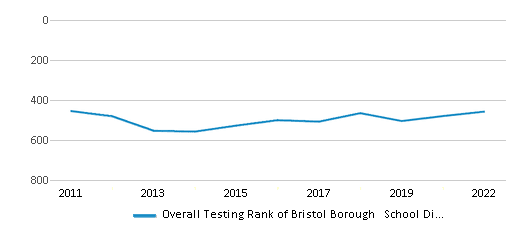
Math Test Scores (% Proficient)
29%
36%
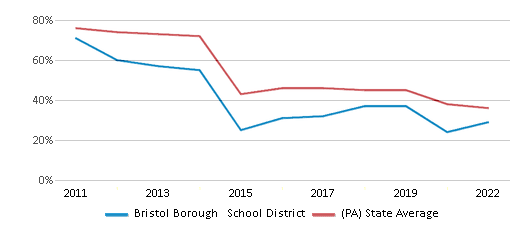
Reading/Language Arts Test Scores (% Proficient)
49%
55%
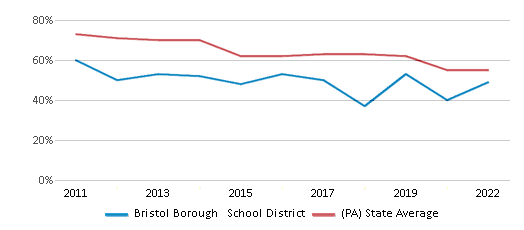
Science Test Scores (% Proficient)
45%
57%
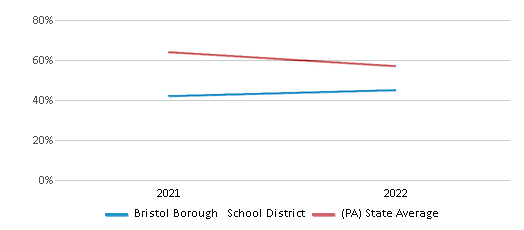
Graduation Rate
85-89%
87%
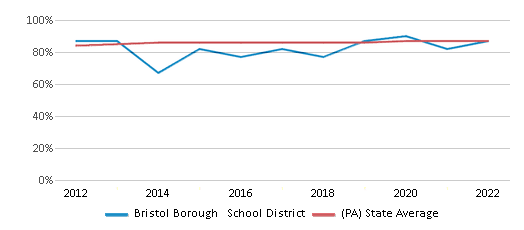
Students by Ethnicity:
Diversity Score
0.66
0.59
# American Indian Students
2 Students
3,204 Students
% American Indian Students
n/a
n/a
# Asian Students
11 Students
78,034 Students
% Asian Students
1%
5%
# Hispanic Students
281 Students
249,018 Students
% Hispanic Students
25%
15%
# Black Students
143 Students
237,342 Students
% Black Students
13%
14%
# White Students
568 Students
1,011,502 Students
% White Students
51%
61%
# Hawaiian Students
2 Students
1,518 Students
% Hawaiian Students
n/a
n/a
# Two or more races Students
110 Students
88,750 Students
% of Two or more races Students
10%
5%
Students by Grade:
# Students in PK Grade:
-
8,485
# Students in K Grade:
79
114,122
# Students in 1st Grade:
73
120,768
# Students in 2nd Grade:
101
126,133
# Students in 3rd Grade:
81
120,907
# Students in 4th Grade:
102
125,578
# Students in 5th Grade:
84
126,001
# Students in 6th Grade:
90
126,714
# Students in 7th Grade:
92
128,950
# Students in 8th Grade:
89
129,786
# Students in 9th Grade:
91
141,323
# Students in 10th Grade:
85
138,358
# Students in 11th Grade:
75
131,939
# Students in 12th Grade:
75
129,584
# Ungraded Students:
-
-
District Revenue and Spending
The revenue/student of $23,765 is higher than the state median of $23,696. The school district revenue/student has grown by 7% over four school years.
The school district's spending/student of $22,156 is less than the state median of $23,119. The school district spending/student has grown by 7% over four school years.
Total Revenue
$27 MM
$39,541 MM
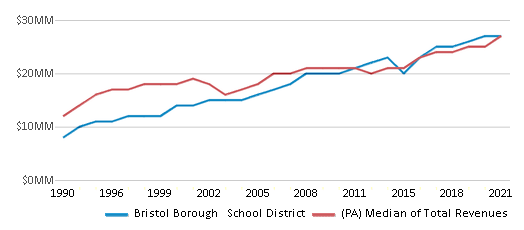
Spending
$25 MM
$38,578 MM
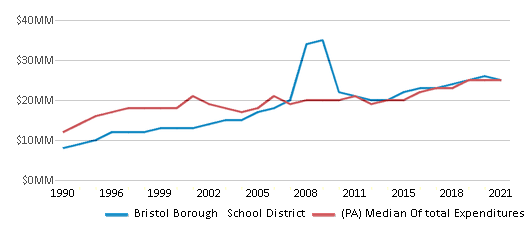
Revenue / Student
$23,765
$23,696
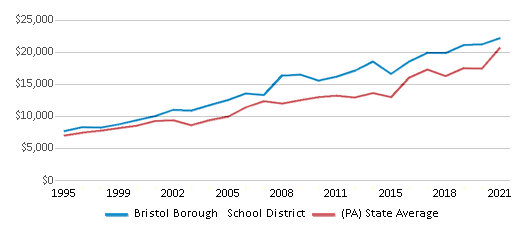
Spending / Student
$22,156
$23,119
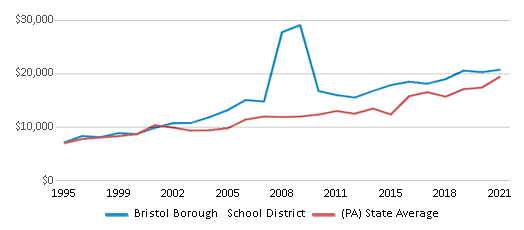
Best Bristol Borough School District Public Schools (2025)
School
(Math and Reading Proficiency)
(Math and Reading Proficiency)
Location
Grades
Students
Rank: #11.
Warren Snyder-john Girotti Elementary School
(Math: 36% | Reading: 47%)
Rank:
Rank:
4/
Bottom 50%10
450 Beaver St
Bristol, PA 19007
(215) 781-1000
Bristol, PA 19007
(215) 781-1000
Grades: PK-6
| 610 students
Rank: #22.
Bristol High School
(Math: 20-29% | Reading: 50-54%)
Rank:
Rank:
4/
Bottom 50%10
1801 Wilson Avenue
Bristol, PA 19007
(215) 781-1000
Bristol, PA 19007
(215) 781-1000
Grades: 9-12
| 326 students
Rank: #33.
Bristol Middle School
(Math: 15-19% | Reading: 45-49%)
Rank:
Rank:
3/
Bottom 50%10
1801 Wilson Ave
Bristol, PA 19007
(215) 781-1000
Bristol, PA 19007
(215) 781-1000
Grades: 7-8
| 181 students
Frequently Asked Questions
How many schools belong to Bristol Borough School District?
Bristol Borough School District manages 3 public schools serving 1,117 students.
What is the rank of Bristol Borough School District?
Bristol Borough School District is ranked #464 out of 675 school districts in Pennsylvania (bottom 50%) based off of combined math and reading proficiency testing data for the 2021-2022 school year. This district ranks in the top 20% of Pennsylvania school districts for: Most diverse schools (Top 1%)
What is the racial composition of students in Bristol Borough School District?
51% of Bristol Borough School District students are White, 25% of students are Hispanic, 13% of students are Black, 10% of students are Two or more races, and 1% of students are Asian.
What is the student/teacher ratio of Bristol Borough School District?
Bristol Borough School District has a student/teacher ratio of 13:1, which is lower than the Pennsylvania state average of 14:1.
What is Bristol Borough School District's spending/student ratio?
The school district's spending/student of $22,156 is less than the state median of $23,119. The school district spending/student has grown by 7% over four school years.
Recent Articles

What Is A Charter School?
Explore the world of charter schools in this comprehensive guide. Learn about their history, how they operate, and the pros and cons of this educational innovation. Discover key facts about charter schools, including admission policies, demographics, and funding, as well as what to look for when considering a charter school for your child.

10 Reasons Why High School Sports Benefit Students
Discover the 10 compelling reasons why high school sports are beneficial for students. This comprehensive article explores how athletics enhance academic performance, foster personal growth, and develop crucial life skills. From improved fitness and time management to leadership development and community representation, learn why participating in high school sports can be a game-changer for students' overall success and well-being.

February 05, 2025
Understanding the U.S. Department of Education: Structure, Impact, and EvolutionWe explore how the Department of Education shapes American education, from its cabinet-level leadership to its impact on millions of students, written for general audiences seeking clarity on this vital institution.





